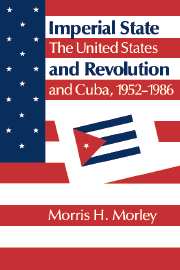Book contents
- Frontmatter
- Contents
- Acknowledgments
- 1 The U.S. imperial state: theory and historical setting
- 2 The United States in Cuba 1952–1958: policymaking and capitalist interests
- 3 The United States in Cuba 1959–1961: national-social revolution, state transformation, and the limits of imperial power
- 4 The United States against Cuba 1961-1968: politics of confrontation in Latin America
- 5 The United States against Cuba 1961–1968: politics of global economic blockade
- 6 The United States against Cuba 1968–1980: intransigent policymaking and its consequences
- 7 The U.S. imperial state: some final insights
- Epilogue. The Reagan administration and Cuba: the revival of vendetta politics 1981–1986
- Appendix 1 The impact and effectiveness of the U.S. global economic blockade on Cuban development
- Appendix 2 Tables
- Notes
- Bibliography
- Index
Epilogue. The Reagan administration and Cuba: the revival of vendetta politics 1981–1986
Published online by Cambridge University Press: 04 May 2010
- Frontmatter
- Contents
- Acknowledgments
- 1 The U.S. imperial state: theory and historical setting
- 2 The United States in Cuba 1952–1958: policymaking and capitalist interests
- 3 The United States in Cuba 1959–1961: national-social revolution, state transformation, and the limits of imperial power
- 4 The United States against Cuba 1961-1968: politics of confrontation in Latin America
- 5 The United States against Cuba 1961–1968: politics of global economic blockade
- 6 The United States against Cuba 1968–1980: intransigent policymaking and its consequences
- 7 The U.S. imperial state: some final insights
- Epilogue. The Reagan administration and Cuba: the revival of vendetta politics 1981–1986
- Appendix 1 The impact and effectiveness of the U.S. global economic blockade on Cuban development
- Appendix 2 Tables
- Notes
- Bibliography
- Index
Summary
When the Reagan administration assumed office in January 1981, it was determined to reverse the incremental decline in U.S. global power since the halcyon days of the 1950s. Carter had shifted to a more interventionist foreign policy late in his presidency, a policy triggered by the Shah of Iran's overthrow in January 1979 and codified in the so-called Carter Doctrine of January 1980, and this drift toward direct action was embellished by Reagan's new set of policymakers and emptied of remaining Carter ambiguities, such as his concern with human rights. In Central America, for instance, while the Carter White House had initiated military solutions to problems that were fundamentally socioeconomic by increasing military assistance and introducing Pentagon advisors into the region in 1979 and 1980 and reviving the red herring of Cuban-Soviet conspirators, this merely provided the foundation for an extraordinary intensification of U.S. military commitments during the Reagan presidency.
Military options have become paramount under Reagan. Emphasizing the buildup of U.S. military, strategic, and covert capabilities throughout the world, the Reagan White House has sought to reestablish American military superiority over the Soviet Union, limit its senior Western Alliance partners' (Western Europe and Japan) ability to pursue independent economic and foreign policies, and reverse established revolutionary governments in the Third World. Although Carter policy toward Third World revolutionary and nationalist regimes emphasized containment and isolation, under Reagan there has been a revival of the 1950s doctrine of “rollback” or “liberation” that goes well beyond his predecessor's approach.
- Type
- Chapter
- Information
- Imperial State and RevolutionThe United States and Cuba, 1952–1986, pp. 317 - 366Publisher: Cambridge University PressPrint publication year: 1988



